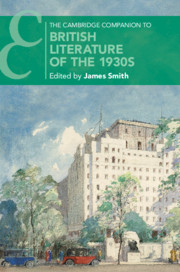Book contents
- The Cambridge Companion to British Literature of the 1930s
- The Cambridge Companion to British Literature of the 1930s
- Copyright page
- Contents
- Notes on Contributors
- Introduction
- Chapter 1 Poetry
- Chapter 2 The Literary Novel
- Chapter 3 Drama
- Chapter 4 Publishing and Periodicals
- Chapter 5 The Middlebrow and Popular
- Chapter 6 Modernism
- Chapter 7 Communism and the Working Class
- Chapter 8 Empire
- Chapter 9 Travel
- Chapter 10 The Regional and the Rural
- Chapter 11 The Queer 1930s
- Chapter 12 Remembering and Imagining War
- Chapter 13 Fascism and Anti-Fascism
- Chapter 14 Fashioning the 1930s
- Index
- Cambridge Companions to …
Chapter 1 - Poetry
Published online by Cambridge University Press: 18 December 2019
- The Cambridge Companion to British Literature of the 1930s
- The Cambridge Companion to British Literature of the 1930s
- Copyright page
- Contents
- Notes on Contributors
- Introduction
- Chapter 1 Poetry
- Chapter 2 The Literary Novel
- Chapter 3 Drama
- Chapter 4 Publishing and Periodicals
- Chapter 5 The Middlebrow and Popular
- Chapter 6 Modernism
- Chapter 7 Communism and the Working Class
- Chapter 8 Empire
- Chapter 9 Travel
- Chapter 10 The Regional and the Rural
- Chapter 11 The Queer 1930s
- Chapter 12 Remembering and Imagining War
- Chapter 13 Fascism and Anti-Fascism
- Chapter 14 Fashioning the 1930s
- Index
- Cambridge Companions to …
Summary
For most twenty-first-century readers, the starting place for studying the poetry of the 1930s is Robin Skelton’s much-reprinted 1964 anthology Poetry of the Thirties. More influential even than Samuel Hynes’s book The Auden Generation (1976), it established the 1930s English canon as the poems of upper-middle-class educated men born between 1902 and 1916, a generation cut off from traditional certainties by the Great War in which they were too young to fight. Consciously departing from the patriotism and rural imagery of Georgian poetry, these men admired T. S. Eliot’s The Waste Land (1922) but refused the modernist decentring of the post-Romantic subjective ‘I’.
- Type
- Chapter
- Information
- Publisher: Cambridge University PressPrint publication year: 2019

